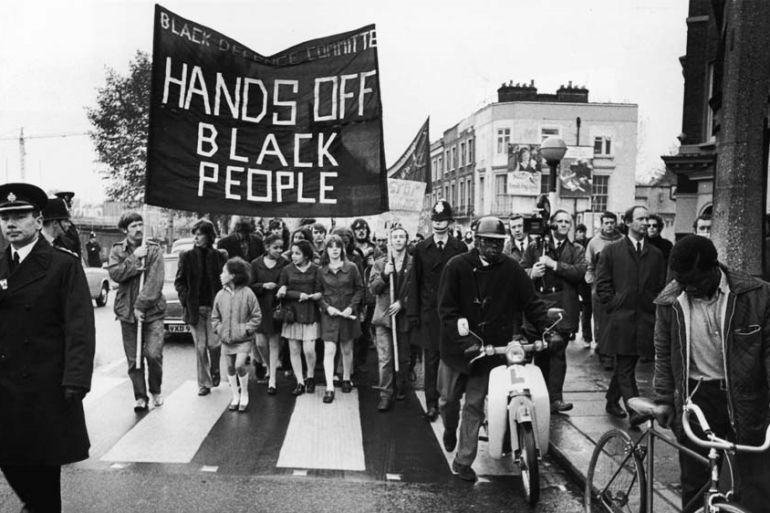
Journalism, identity and what Stuart Hall taught me
Stuart Hall ‘taught me how Britain was founded on race and class – and how the media were central to those structures’.
I first started reading Stuart Hall, the cultural theorist, in the early 1990s as an undergraduate student in Britain. The heyday of overt tabloid racism was over by then, but new styles of racist reporting were emerging.
On the one hand, cultural identity was an increasing focus, with much of the media echoing the idea that the presence of blacks and Asians undermined a cohesive sense of Britishness. On the other hand, the small number of refugees arriving in Britain were vilified as scroungers and cheats.
Keep reading
list of 4 itemsWhat happens when activists are branded ‘terrorists’ in the Philippines?
Are settler politics running unchecked in Israel?
Post-1948 order ‘at risk of decimation’ amid war in Gaza, Ukraine: Amnesty
When a few hundred gypsies settled in Dover on England’s south coast, fleeing neo-Nazi gangs in the Czech Republic and Slovakia, Rupert Murdoch’s best-selling Sun newspaper called them “Slovak Spongers” and “Giro Czechs” (a pun on a common term for welfare payments) and suggested “teaching the gypsies two words, the second one being off”.
This kind of media coverage, of course, continues to this day. It is easy to denounce, but harder to cogently analyse it. Hall’s work helped me to get beyond simplistic explanations that put the blame on an inherent English racism or mechanical pursuit of profit.
Hall’s starting point was Marxism. But he followed another African-Caribbean scholar, Frantz Fanon, in his recommendation that Marxist analysis be “slightly stretched” in dealing with questions of race and colonialism. To understand the Jamaican society in which he had grown up, Hall combined the Marxist categories of class and capitalism with insights into the role of culture in colonialism. When Hall settled in England in 1951, he used the same approach to understand how racism functioned there.
To the columnists who supposed that Asian and black immigration to Britain was an alien cultural disruption that undermined a previously stable society, Hall’s response was that Britain had not become multicultural because of postcolonial migration.
Multiculturalism had been there much longer as an integral part of Britain’s imperial project. “It is in the sugar you stir; it is in the sinews of the famous British ‘sweet tooth’; it is in the tea-leaves at the bottom of the ‘British’ cuppa,” noted Hall. There was no British identity that did not include the sugar plantations of the Caribbean and the tea plantations of Asia, the slave and the coolie.
Hall’s 1978 book Policing the Crisis, co-authored with his colleagues at the Centre for Contemporary Cultural Studies in Birmingham, had the biggest impact on me. It presented a picture of Britain in the 1970s as caught in a crisis of authority. The state, forced to intervene more aggressively to hold together a fracturing society, became more naked in its coercion. And a media-constructed image of black crime became a signifier of this deeper crisis. The component parts of Thatcherism were being laid out.
In Hall’s account, racism was not just a matter of individual attitudes and biases. Race was a key constituent of the social and economic structure, a “principal modality” by which class society was experienced and made sense of. Race, he said, was not a marginal concern but right at the centre of British life. At the same time, its significance was never self-contained or transparent; it was a screen on to which deep anxieties were projected and worked through.
One way this happened was through the news media. The conventional approach to analysing the news is to ask whether journalists select and frame events objectively or with bias. Hall’s argument focused instead on how news can have meaning to us only if it aligns with our unconscious “cultural maps” of the social world.
The main ideological function of the news, he argued, is not its alleged liberal or conservative bias but its fidelity to the deeper consensus within which party politics takes place. This happens because the news sources its meanings from the social and political institutions that underpin that consensus, such as the police, the courts, the university, and so on.
No wonder, then, that racism was found in the news as much as on the streets – in both cases, it derived from the same deeper structure that Policing the Crisis had identified. Applied to the 1990s, this method of analysis could explain why refugees, for example, were being treated as such a threat: they too were a screen on to which anxieties deriving from the crisis of Thatcherite Britain were being projected.
It was never Hall’s style to provide final answers. In the 1980s and 1990s, his analysis shifted as he began to view the social world as pure flux: representations floated free of any referent; politics was reduced to the construction of identities.
Ironically, his writing in these later decades, which were more politically stable than the 1970s, pictured society as having no solid foundations. For me, reading Policing the Crisis out of its time in the 1990s taught me how contemporary Britain was solidly founded on race and class – and how the media were central to reproducing those structures.
Arun Kundnani is scholar-in-residence at The Schomburg Center for Research in Black Culture, New York Public Library. He is the author of The Muslims are Coming! Islamophobia, Extremism, and the Domestic War on Terror and The End of Tolerance: Racism in 21st-Century Britain. He writes for The Guardian, Nation, Intercept and The Washington Post, among other publications.
This article forms part of an online project by Al Jazeera English’s media analysis show The Listening Post. Follow #MediaTheorised
The views expressed in this article are the author’s own and do not necessarily reflect Al Jazeera’s editorial policies.